 Amy Stein,
Amy Stein,  Domesticated,
Domesticated,  animals,
animals,  photography
photography  Sunday, October 9, 2011 at 10:55PM
Sunday, October 9, 2011 at 10:55PM 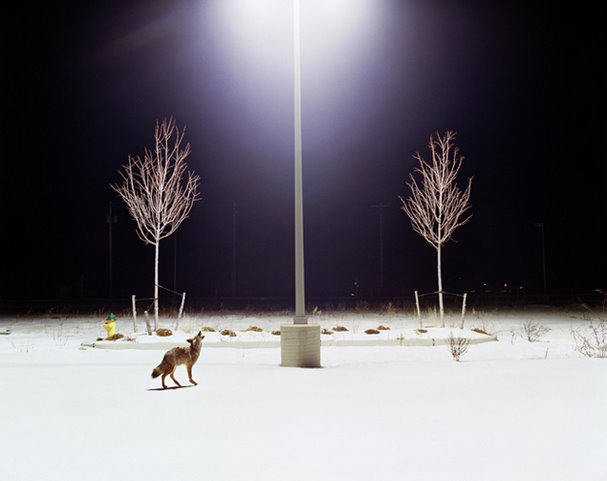
A few months ago I discovered a series of photgraphs by Amy Stein that really touched me. "Domesticated" as she callled the project struck me in a way that no other pictures had done for a long time - and it took me a while to understand why.
I was instantly fascinated by the beautifully captured scenes of what I thought were wild animals and their encounters with civilisation.
These images touched me in two very powerful ways. First of all there was the message. The - to me quite sad - story of how humans interfere with nature, how they destroy natural habitats, replace forests with parking lots and cut painful scars through the wild with their concrete highways. All topics that I am really concerned about.
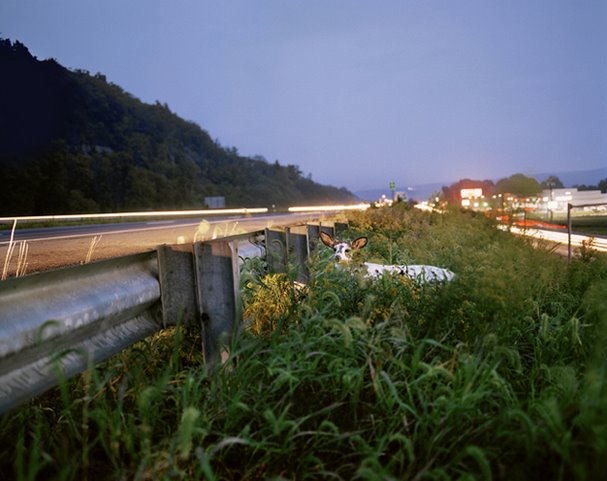
But there was also another way in which these photos captured my thoughts. As a photographer I was amazed about how well these photos were composed. Assuming these where reportage documentary style photographs I could not stop looking at them thinking how lucky, brave and patient Amy Stein must have been to photograph those very delicate special moments.
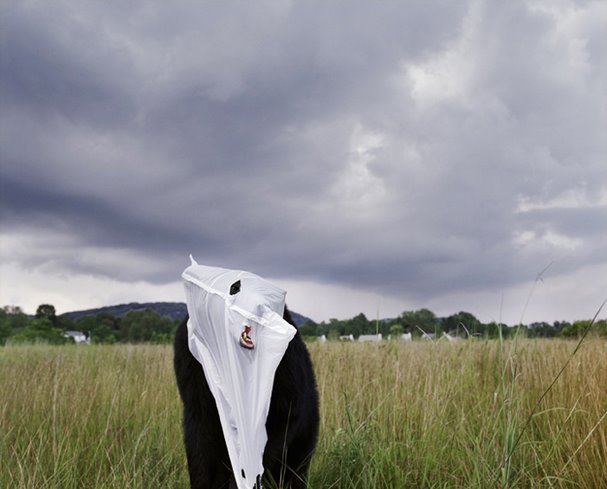
Somehow though I thought, maybe all was not as it seemed. These pictures were almost too good to be true. After all, these were wild animals and the photographer was very close to them when she captured these quite surreal and fairy tale like special intricate moments.
So when I read the artist statement on Amy's webpage in which she declares that these images were staged I was not too surprised. I have to admit I was a little disappointed at first but then suddenly these images lid up in a very different even more magnificient light.
I instantly asked myself - if these images where staged then HOW did Amy do it? As I didn't want to break my head about it any longer - I thought I'd get in touch with Amy and ask her myself. I was delighted when Amy who lives in New York and was heavily pregnant at that time - happily agreed to answer all my questions.
In an afternoon Skype session in June she agreed to tell me all the secrets about her project.
Right in the beginning of the interview she admitted that she enjoys that a lot of people think that these images are captured with living animals and these were the most amazing wild life images. But she said that it's not a secret that these images are all staged.
A few years ago she worked in a small town in Pennsylvania situated between the Delaware river and a big mountain area - a rural, simple place, where many people go hunting in their spare time.
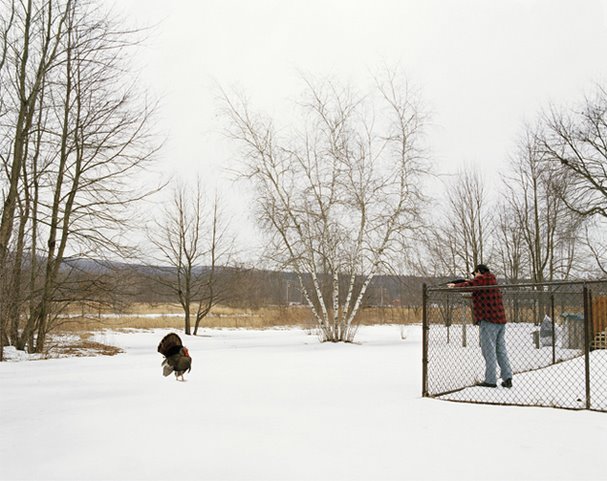
She somehow became fascinated with taxidermy and started hanging out in the shop where local hunters would get their killed animals preserved. She would listen to their stories which were often about about animals coming down from the mountains and on their migrations liked to roam through the town in search for food. Trash cans or the dogs and cats of the neighbourhood would all become valuable sources of food - especially for the smart and very adaptable coyotes.
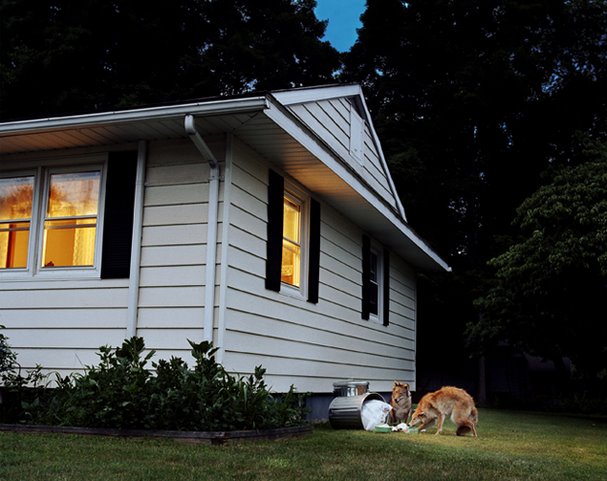
Amy got inspired by these stories about human and animal encounters and she wanted to turn them somehow into images. But she knew she could not photograph them in a documentary style. She asked herself how she could re-create these moments and really pull in the tension and beauty and wonder of these encounters while doing it completely on her own terms.
That's when she decided to re-enact these stories using the stuffed animals from the taxidermist plus occasionally living and dead animals. (All animals on the photos in this artical are preserved ones).
It took her roughly one month per photo, for scouting the locations, organising the people and the animals.
She told me the story about "Watering Hole" - the image with the bear and girl at the swimming pool - which is one of the most iconic and most reproduced shots of the series - plus also the cover of the book. She said there was a family living at the edge of the town. They owned one of the few swimming pools of the community.
Quite often they would find bears drinking the water and swimming in the pool which of course frightened them. As they had a little girl to protect they built a fence around their property. Amy said it fascinates her that people seem to want to live close to nature but then when nature comes close to them - they want to build a border between them and the wild.
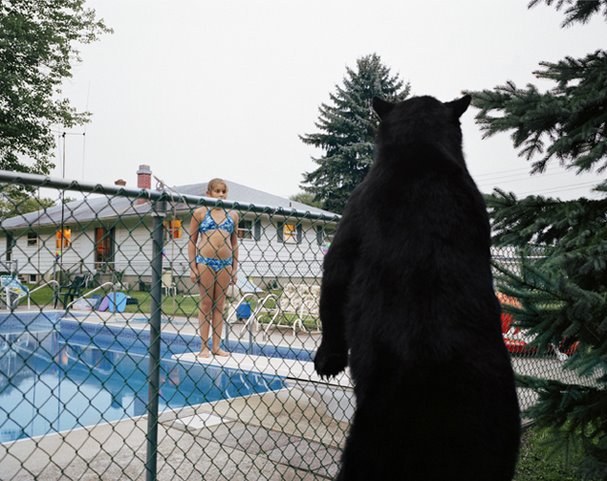
"Howl" is another photo which is really popular with people around the world - and myself. It shows a coyote which instead to the moon howls upwards to a parking lot lamp (the photo at the top of the article). She got the idea from another story she heard, of a super market where people where scared to go back to their cars, because at night coyotes would roam the parking lot and howl at the lights. The customers asked for escorts to make them feel safer.
I believe that "Howl" is a very powerful image that brings the underlying ideas of the project across in a way that is understandable to anyone. The confrontation of human and animal and also the animal confused in a manmade environment.
Although the viewer can clearly understand that message - Amy's aim was never to preach about this issue and say: "Look at how we harm those animals!" - She just wanted to somehow show the beauty of what is happening here. It was more about the interchangeable relationship between humans and animals. She wants to raise the questions: Who is the aggressor? Who invades who? Is it the humans invading the "animal's nature" or are the animals invading the "humans' nature"?
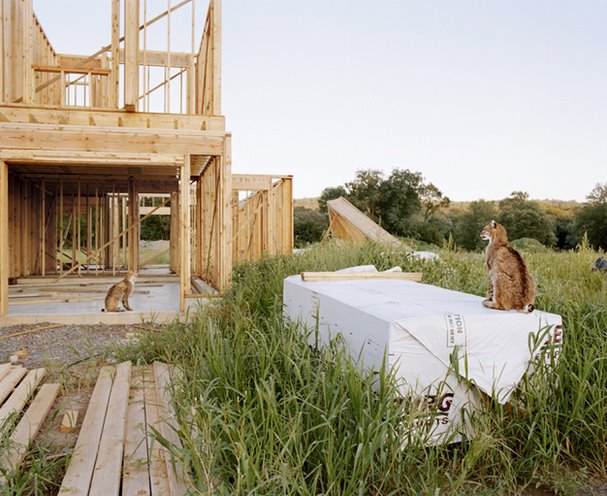
I really do think that Amy achieved what she wanted to achieve. These photos are stunningly told stories about man versus nature. What I really like about them is that rather than using gritty reportage images that hit you with the power of a sledge hammer she uses dreamy fairy tale like photos - which I believe crawl slowly into your conscience but stay there forever.
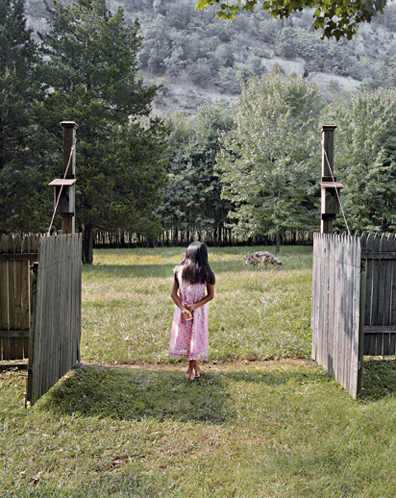
For more images and to learn more about Amy Stein's other projects visit here website: www.amysteinphoto.com
 Amy Stein,
Amy Stein,  Domesticated,
Domesticated,  animals,
animals,  photography
photography